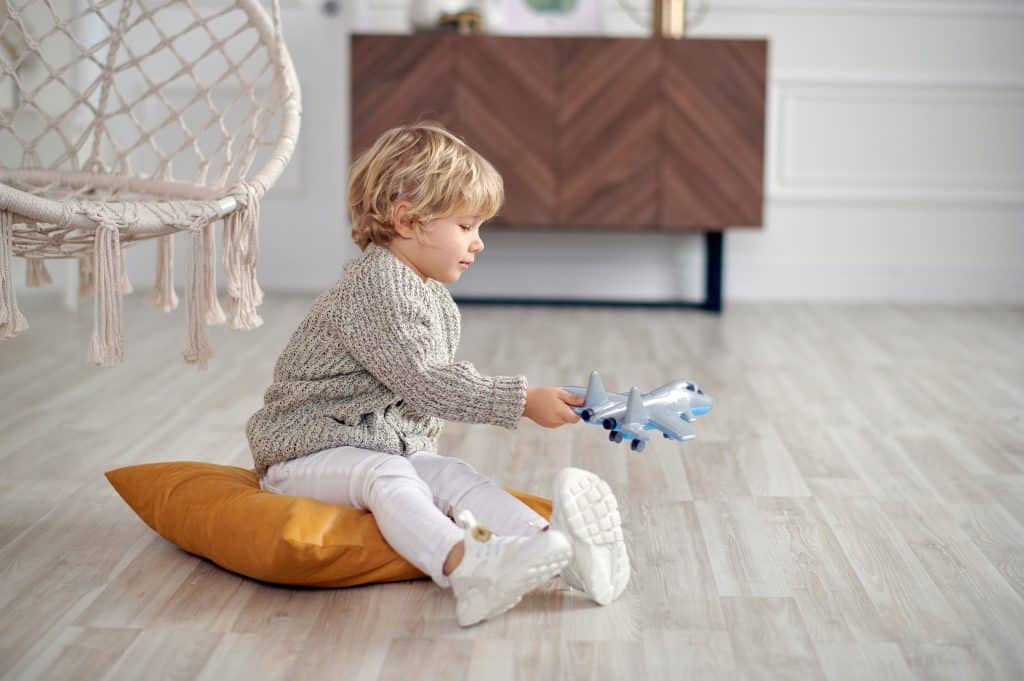Imagine a Sunday afternoon: you’re at the park, the sun is shining, birds are chirping, and your toddler is having a blast. Suddenly, the laughter turns into tantrums, the smiles into tears. You’ve entered the realm of overstimulation, a common scenario for many parents, especially those with neurodivergent children. In this blog post, I’ll share practical strategies how to calm an overstimulated toddler. We’ll delve into understanding overstimulation, its triggers, and how to effectively navigate these intense moments.
Table of Contents
Staying Calm Amid the Chaos
First and foremost, keeping your cool when your toddler is overstimulated is crucial. I’ve seen it repeatedly in my practice: the calmer you are, the quicker your child will calm down. Your steadiness can serve as an anchor, providing a sense of security for your child. And remember, it’s perfectly normal for kids, especially neurodivergent kids, to experience overstimulation.
Moreover, it’s important to remember that this isn’t a reflection of your parenting. Overstimulation happens to every child at some point. It’s a part of their learning and growth process. So, take a deep breath and let’s explore some strategies.

Read more: Is Cocomelon Too Overstimulating?
Change the Environment
When it comes to calming an overstimulated toddler, a change of scenery can work wonders. If you’re in a noisy, crowded place, try moving your child to a quieter, more familiar setting. This could be a favorite room at home or a different part of the park. Reducing noise and action can help your child regain their equilibrium.
At home, you can create a calming corner with soft pillows, favorite toys, and books. This can be a safe space for your child to retreat when overwhelmed.
Deep Breathing: A Simple Yet Powerful Tool
Deep breathing is a simple yet powerful tool for calming an overstimulated toddler. Encourage your child to take slow, deep breaths in through their nose and out through their mouth. This technique can help soothe their nervous system and bring them back to calm.
For instance, you can make a game out of it. Pretend to inflate a balloon in your belly, then slowly let the air out. This can make the process fun and engaging for your child.

Applying Pressure Can Help
Deep pressure can be a game changer for kids with special needs. This technique can help your child calm down and reorganize their emotions and behavior. You can provide deep pressure through hugs, snuggles, or even with the help of weighted blankets.
Remember, every child is different. What works for one may not work for another. So, it’s all about finding what your child responds to best.
Calming Activities: A Go-To Strategy
Calming activities can be a go-to strategy for managing overstimulation. Let your child sit quietly while doing calming activities like reading, playing with a stuffed animal, or cuddling up with you. Other distractors include calming toys or extra snuggles.
Activities that engage the senses, like playing with play-doh or listening to soft music, can also be helpful. The key is to find activities that your child enjoys and finds soothing.

Read More: Autism Meltdown
Dimming the Lights: A Simple Yet Effective Strategy
Dimming the lights can be a simple yet effective strategy for calming an overstimulated toddler. This can help signal to your child’s body that it’s close to bedtime or naptime, which can help them calm down.
Consider using dimmable lights or installing a dimmer switch in your child’s room. This can give you control over the lighting and help create a calming environment.
Blowing Bubbles: More Than Just Fun
Believe it or not, blowing bubbles can actually help calm an overstimulated toddler. It’s not just about the fun and joy of watching bubbles float and pop. Blowing can help your child focus, slow down their breathing, and ultimately calm down.
Plus, it can also help with visual tracking and developing focus. So, next time your child is feeling overwhelmed, try breaking out the bubble solution!
Tired of Emotional Meltdowns?
Goally’s Mood Tuner app has activities for kids with BIG emotions. Teach kids how to tune their mood with Goally. See fewer meltdowns.
The Mood Tuner app encourages kids to look inwards and identify their feelings, helping them understand what’s going on inside. Once they’ve recognized their emotions, they can choose from a 20+ activities designed to help them self-regulate and find their balance.

To Sum Up
In wrapping up, calming an overstimulated toddler may seem challenging, but with some patience and the right strategies, it’s definitely manageable. Each child is unique, so it’s about finding what works best for your child. Take these tips and apply them in your day-to-day life. You’ll not only help your child navigate overstimulation, but also foster a deeper connection with them.
FAQs about How To Calm an Overstimulated Toddler
What causes overstimulation in toddlers? Overstimulation in toddlers can be caused by a variety of factors, including too much noise, bright lights, crowded places, or even an overwhelming day full of activities. How can I tell if my toddler is overstimulated? Signs of overstimulation can include tantrums, difficulty focusing, restlessness, and in some cases, physical symptoms like a racing heart or rapid breathing. Are there any specific toys that can help calm an overstimulated toddler? Yes, sensory toys like fidget spinners, stress balls, or weighted blankets can be helpful in calming an overstimulated toddler. How long does it take for an overstimulated toddler to calm down? The time it takes for a toddler to calm down can vary greatly depending on the child and the situation, but with the right strategies, it can usually be managed within a few minutes to an hour. Can certain foods or drinks cause overstimulation in toddlers? Yes, foods or drinks high in sugar or caffeine can contribute to overstimulation in toddlers. It's always best to maintain a balanced diet for your child.
This post was originally published on 04/07/2023. It was updated on 02/17/2024.

Goally
We help parents teach their kids life skills, like doing bedtime and morning independently. Backed by science, we incorporate evidence-based practices and expert-informed designs in all of our apps and content.





